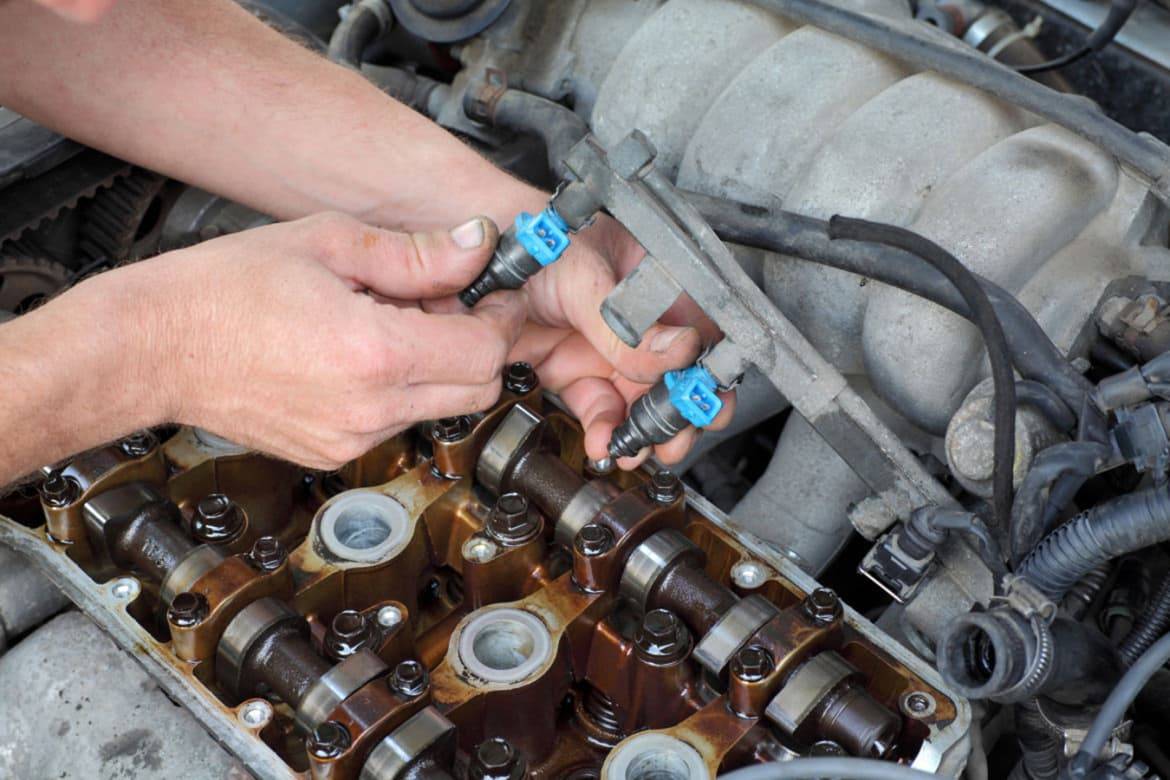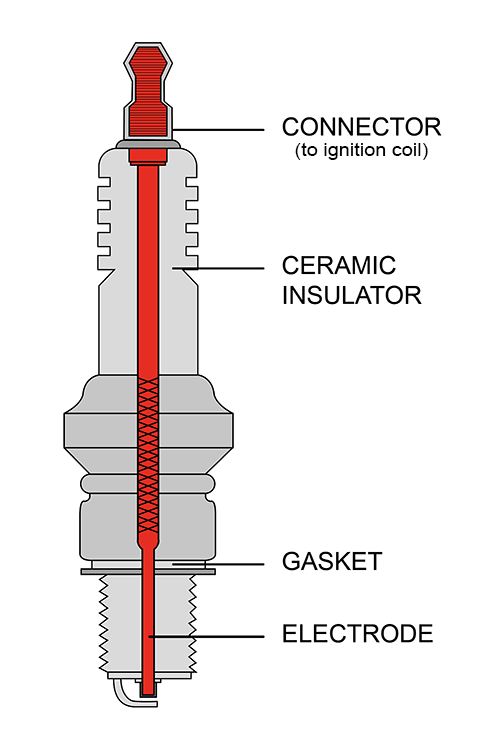Have you ever popped the hood of your car and wondered about the complex machinery that powers your daily drives? It’s fascinating, isn’t it?
You might have heard terms like “fuel injection” and “spark plugs,” but how do they fit together in the world of modern cars? If you’re curious about whether fuel-injected cars still use spark plugs, you’re not alone. This question often leaves drivers puzzled.
Spark plugs are essential for igniting the fuel-air mixture, but with advancements in technology, car engines have evolved. Are spark plugs still part of the equation in fuel-injected vehicles? By understanding this, you can gain insights into your car’s performance and maintenance needs. Dive into this article to unravel the mystery and discover what really happens under the hood.

Credit: www.cars.com
Fuel Injection Basics
Fuel injection is a critical component in modern cars, ensuring your vehicle runs smoothly and efficiently. If you’ve ever wondered how your car translates fuel into movement, understanding the basics of fuel injection can be enlightening. Whether you’re a seasoned driver or just curious about your car’s inner workings, diving into fuel injection basics will enhance your appreciation for automotive engineering.
How Fuel Injection Works
Fuel injection systems deliver fuel directly into the engine’s cylinders. This is done with remarkable precision, allowing for optimal combustion. The system uses sensors to monitor various aspects like engine temperature and air intake.
These sensors provide real-time data to the engine control unit (ECU). The ECU then adjusts the fuel-air mixture accordingly, ensuring your engine runs efficiently. Ever noticed how your car starts smoothly even in cold weather? You can thank the fuel injection system for that.
Consider your morning coffee machine. It dispenses the right amount of water to brew your coffee perfectly. Fuel injection works similarly, but with fuel and air, creating the perfect mix for combustion.
Types Of Fuel Injection Systems
There are several types of fuel injection systems, each offering unique benefits. The most common types are direct and indirect injection. Direct injection delivers fuel straight into the combustion chamber. This method is known for its efficiency and power.
Indirect injection, on the other hand, sprays fuel into the intake manifold before reaching the combustion chamber. This type is often found in older models and tends to be less efficient than direct injection.
Have you ever compared a flip phone to a smartphone? That’s similar to comparing older carburetor systems to modern fuel injection. While both serve the same fundamental purpose, fuel injection brings precision and adaptability to the table.
Fuel injection systems are constantly evolving. What type of system does your car have? Understanding this can help you appreciate the technology that powers your daily drive.
Role Of Spark Plugs
Fuel injected cars still rely on spark plugs for ignition. These essential components ignite the air-fuel mixture in the engine’s cylinders. Without spark plugs, engines wouldn’t start or run efficiently.
The role of spark plugs in your car’s engine is crucial and often overlooked. You might be wondering if fuel-injected cars even have spark plugs. The short answer is yes, they do. Understanding how spark plugs function can help you appreciate their importance in your vehicle’s performance.Function In Combustion
Spark plugs play a vital role in the combustion process. They ignite the air-fuel mixture in your engine’s cylinders, which is essential for generating the power needed to move your car. Without this ignition, your engine would simply not run. Imagine the spark plug as the match that lights the fire. If the match doesn’t strike, there’s no flame. This small but mighty component ensures your engine starts and keeps running smoothly.Importance In Engine Performance
The condition of your spark plugs can significantly affect your engine’s performance. Worn-out plugs can cause misfires, reducing fuel efficiency and power. You might notice your car feeling sluggish or consuming more fuel than usual. Regular maintenance of spark plugs is vital. Replacing them at recommended intervals can improve fuel economy and reduce emissions. Think of it as a small investment for a smoother ride and a healthier engine. Have you ever experienced a sudden drop in your car’s performance? It might be time to check those spark plugs. Keeping them in good shape can make a noticeable difference in your driving experience.Fuel Injected Cars Explained
Fuel injected cars have changed how engines perform. These cars use a system that delivers fuel directly into the engine’s combustion chamber. This method increases efficiency and power. Unlike older carburetor systems, fuel injection offers precise control over fuel delivery. It helps engines run smoothly and start easily.
Fuel injected engines are common in modern vehicles. They adapt to changing conditions, ensuring optimal performance. This technology reduces emissions, making cars more environmentally friendly. Drivers enjoy better fuel economy and lower maintenance costs.
Engine Design In Modern Cars
Modern engines are complex and designed for efficiency. Fuel injection is a key part of this design. It works with other engine components to maximize performance. Computers control the fuel injection process. They adjust the amount of fuel based on engine needs.
These engines often include sensors. Sensors monitor conditions like air temperature and engine speed. This data helps the system make precise adjustments. The result is a smoother ride and better acceleration.
Integration Of Spark Plugs
Spark plugs are crucial in fuel injected engines. They ignite the fuel-air mixture in the combustion chamber. This ignition process powers the engine. Without spark plugs, the engine cannot run.
The integration of spark plugs with fuel injection is seamless. Both components work together to ensure efficient combustion. Proper maintenance of spark plugs is essential. It ensures the engine runs efficiently and prevents misfires.
Fuel injected cars rely on spark plugs for optimal performance. Regular checks and replacements keep the engine in top condition. This integration is vital for engine longevity and reliability.

Credit: www.championautoparts.com
Common Misconceptions
When it comes to the world of cars, misconceptions can easily lead you down the wrong path. Many people often wonder if fuel-injected cars have spark plugs. It’s a question that might sound straightforward but carries a lot of confusion. Understanding the differences between fuel injection and carburetion is key to clearing up these misconceptions.
Fuel Injection Vs. Carburetion
Fuel injection and carburetion are two methods of delivering fuel to an engine. Carburetors are older technology and work by mixing air with fuel before it enters the engine. They rely on vacuum pressure created by the engine to pull fuel into the air stream.
Fuel injection, on the other hand, is a more precise method. It uses electronic controls to spray fuel directly into the engine. This system adjusts the fuel delivery based on various factors like engine speed and load. While carburetors are largely obsolete in modern cars, fuel injection systems are now the standard.
Spark Plug Necessity
Regardless of whether a car uses fuel injection or carburetion, spark plugs are essential. They ignite the air-fuel mixture in the engine’s cylinders, starting the combustion process. Without spark plugs, your engine wouldn’t run.
Fuel-injected cars definitely have spark plugs. Just because the fuel delivery system has evolved doesn’t mean the need for spark plugs has disappeared. They remain crucial in any gasoline engine, ensuring efficient combustion and smooth engine operation.
Have you ever wondered why spark plugs sometimes need replacing? It’s because they wear out over time, affecting engine performance. Regular maintenance is key to keeping your vehicle running efficiently. When was the last time you checked your spark plugs?
It’s easy to get confused with all the technical jargon surrounding cars. But understanding the basics, like the need for spark plugs in fuel-injected engines, can save you time and trouble. Next time you’re discussing car engines, you’ll know exactly what keeps them running smoothly.
Benefits Of Fuel Injection
Fuel injected cars often have spark plugs to ignite the fuel-air mixture. They provide better fuel efficiency and cleaner emissions. Spark plugs play a crucial role in ensuring smooth engine performance.
Fuel injection has transformed the way we drive, offering numerous advantages over older carburetor systems. It’s not just about getting from point A to point B; it’s about doing so efficiently and with less impact on the environment. If you’ve ever wondered about the benefits of fuel injection, you’re in for an enlightening read.Efficiency And Emissions
Fuel injection systems precisely control the amount of fuel entering the engine. This precision leads to better fuel efficiency. You end up spending less money at the pump, which is always a win. Reduced emissions are another significant benefit. Fuel injectors ensure that fuel burns more completely, which means fewer pollutants are released into the atmosphere. Cleaner air and a healthier planet are benefits that everyone can appreciate.Maintenance And Longevity
Fuel injection systems require less maintenance compared to carburetors. They are less prone to clogging and require fewer adjustments. This means fewer trips to the mechanic and more time enjoying your drive. Moreover, engines with fuel injection tend to last longer. The precise fuel delivery reduces wear and tear. Wouldn’t you prefer your car to have a longer lifespan without frequent costly repairs? When I first switched to a car with fuel injection, I noticed how smooth the drive was. No more stalling at red lights or struggling on steep hills. Have you had a similar experience? It’s a change that keeps on giving.Maintaining Fuel Injected Engines
Maintaining fuel injected engines ensures smooth performance and longevity. These engines rely on precision and efficiency, so regular care is key. Proper maintenance helps prevent costly repairs and extends the lifespan of your vehicle. Let’s explore essential care for spark plugs and regular engine check-ups.
Spark Plug Care
Spark plugs play a critical role in fuel injected engines. They ignite the air-fuel mixture, ensuring the engine runs smoothly. Regular inspection is crucial for optimal performance. Dirty or worn spark plugs reduce efficiency and increase fuel consumption. Replace them every 30,000 miles or as recommended by your vehicle’s manufacturer. Ensure they are free from deposits to maintain ignition power.
Check for signs of wear like cracked insulators or corroded electrodes. These issues can cause misfires and affect engine performance. Using the correct type of spark plug for your engine is essential. Consult your vehicle’s manual for the recommended specifications.
Regular Engine Check-ups
Engine check-ups are vital for fuel injected cars. Regular checks help identify potential problems early. Inspect the fuel injection system for leaks or blockages. These issues can lead to poor fuel economy and engine hesitation.
Routine checks of the air filter and oil levels also help. A clean air filter ensures the engine receives the right amount of air. Proper oil levels maintain engine lubrication, reducing wear and tear. Scheduling regular engine diagnostics can reveal hidden issues.
These inspections ensure your engine runs efficiently and safely. A well-maintained engine offers better performance and reliability.

Credit: en.wikipedia.org
Conclusion
Fuel injected cars do have spark plugs. These plugs ignite the fuel. Ignition ensures the engine runs smoothly. Both fuel injection and spark plugs are vital. They work together in modern engines. Regular maintenance is key for performance. Check spark plugs frequently for wear.
Clean fuel injectors help too. A well-maintained car lasts longer. It also saves fuel and money. Understanding your car’s needs benefits you. It ensures a smoother driving experience. Always consult your car manual. Keep learning about your car. This knowledge helps in the long run.
